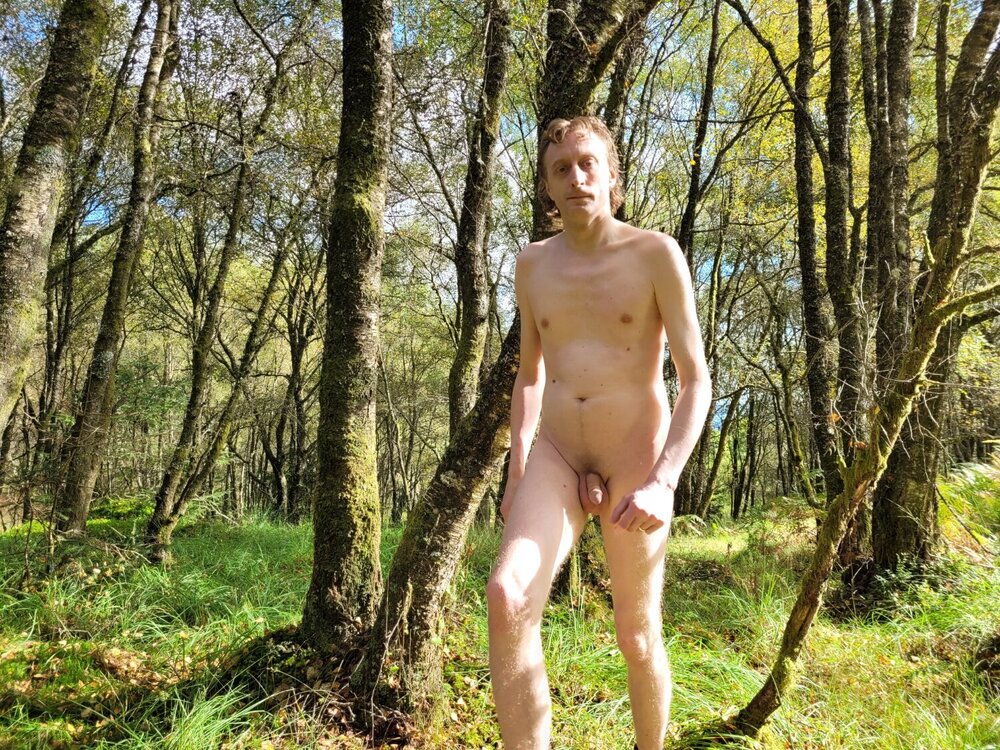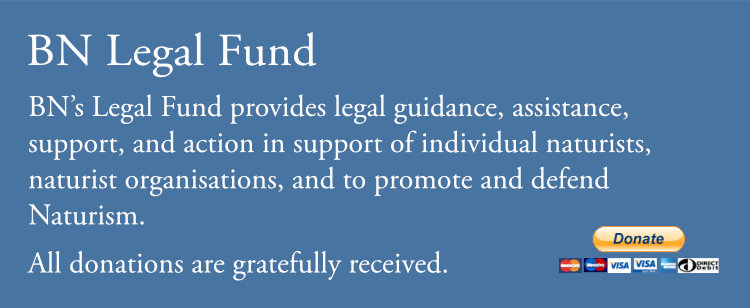Here’s the third part of our article by BN member Sheila Maycock on Naturism and Mental Health, followed by a first-person report from BN member Steff.
Read the previous articles on this website - Part One and Part Two
In Naturism what stands out initially is that people are not noticing, staring, judging or even bothered about what you look like. That’s liberating when the world as we have previously known it is constantly looking, criticising, comparing unfavourably to an unreal ideal, assessing issues such as who is better off - you or me?
This is not the type of noticing that is beneficial to our Mental Health. We live such busy lives, always planning, rushing off to the next thing without taking time out to reflect or consider. Even if we’re not that busy our mind gets over-occupied with worries about the future or concerns that we can actually do very little about and our minds get caught in a negative and unhealthy downward spiral.
In contrast ‘Taking Notice’ (or Mindfulness as it is sometimes called) is a discipline which means you start to deliberately take time to observe what is going on in the world around as well as your own internal responses to those events. You practice being present in the moment, savouring that instant in time, spotting the beautiful, interesting, fascinating, unusual or even weird stuff that goes on around us all the time.
The human brain is awesome and the truth is we only use a tiny part of it in our day to day lives. Most of the brain capacity that we are using is occupied with humdrum everyday stuff, running routine programmes that we don’t even really know we are doing or have to think about. And if our brain doesn’t deem something to be of significance to us—that we have assessed as important, dangerous, of value or interest—then our brain just filters it out. We don’t even see it and we are missing out on the chance to enjoy and appreciate what is going on around us, robbing us of the benefit of good and positive experiences and often over emphasising the negative stuff that comes our way. Finding joy in the minutiae of life: the glint of the sun on a raindrop, the feel of the breeze on your skin, the texture of a fallen tree, even the motes of dust floating in your house, can relax our busy brains for a moment, enough to reset, de-stress and refuel us for the next challenge life throws at us.
Taking note in this way is a step forward in strengthening our self-awareness and self-acceptance, which are things which Naturists have often developed through their experience of Naturism.
Mindfulness has become a new ‘thing’ so there are multiple pages online, courses springing up to teach the approach, and books and articles abounding about the topic. It is a way of focusing on this present moment and not letting our thoughts carry us off. In Mindfulness, attention is given to the now, the breath, the feeling of the ground beneath your feet, the air on your skin and it helps develop awareness of where unhelpful thought patterns may be leading us astray, replacing them with a new approach to appreciating the world in which we live. According to The New Economics Foundation (2008), Mindfulness is as effective as antidepressants in reducing the recurrence of depression.
Naturism provides a natural vehicle for this meditative practice. Being unclothed removes a mask to one’s self as well as others. We have already decided to be more authentic with little to hide from others. Now bolt on a new appreciation of the wealth of experience that surrounds us, that our brain just couldn’t see before because we had deemed it insignificant, and now our brain leaps to attention. Naturism’s immediacy of physical sensations assists in the appreciation of experiences such as the feeling of the water directly on your skin while swimming, the freedom of wandering around without the constraints of clothing. We remove a false self with our clothing and become more authentically who we are.
Sheila Maycock MBACP (Accred) Family Therapist
TRIGGER WARNING
At some point in their lives, most people a will have a brush with a mental health problem. It may be a form of depression, life circumstances, a chronic condition—or even caring for someone who has.
Everyone has their own battles and obstacles throughout life which can affect us all in different ways and I would like to share mine with you.
It was many years ago when I was diagnosed with a condition called Mixed Personality Disorder. That day, as I sat in the psychiatrist’s office, looking at the self-inflicted scars on my arms, the whole world around me went into a blur, like it wasn’t real, or as if they were talking about somebody else. Complete reality numbness. I felt completely isolated and different from the rest of the world, as if everybody I passed on the street could see me as if there were a big, bright spotlight shining down on me as I made my way home.
The doctor’s words continued to repeat over and over again in my head along with an intense feeling of fear. What will happen to me now? Will I have to live like this forever? Is there a way to control the constant state of anxiety and panic that I experience? The future crumbled and became a dark empty void, like a tunnel with no light, closing in around me.
In time I began to feel like I owed people something for the lack of visibility of my condition. They would usually only see me on my better days as I would isolate and hide myself away on the darker days: days when I would struggle to get out of bed, when I would be fighting the intense impulses to end my life, harm myself or battle the overwhelming feeling of sadness, despair, and self- loathing that no form of distraction would ever relinquish. Nobody sees those days, I hide them away behind the smiles, the jokes and silliness that I use as a form of cover or shield like it’s a different level of vulnerability, a weakness that must never be seen by anybody ever.
I’m lucky enough to have people around me, my doctors, my wife, and friends who all stand by me, but there can be a thousand people around and I would still feel alone. Trapped within my own thoughts, like a being in a mental prison, looking out and seeing everyone on the other side of the bars.
My doctors are aware that I am a Naturist. We have talked about it a lot. I would describe to them how being in a Naturist environment made me feel—like I don’t have to hide anymore, how quickly a person’s confidence can rise to a balanced level in a Naturist setting, how we become human beings again without separation of social class that society seems to force upon us. They would remark on how I seemed to “spark into life” and project a “powerful aura of positivity and confidence” while speaking about Naturism, something in which is usually a rare trait to see in me.
When I discovered British Naturism, I finally found a place where differences were embraced, a place that accepted me for who I am and how I was made, a place I truly belonged. The doctors unanimously agreed that I continue the Naturism lifestyle and become more proactive within it, based on the positive effect that it had repeatedly shown on my mental wellbeing. In a way I guess that makes Naturism doctors’ orders for me.
The Covid outbreak had an impact on everyone in some way. People developed mental health conditions and people who already had them struggled even more. We were all suddenly trapped in our houses, could no longer socialise with our friends and family, something we all needed at this time, for some more so than ever. Many of us soon ran out of things to occupy our minds. Relying heavily on social media and television with its seemingly endless stream of updates reminding us of the frightening situation that we are all in. It gave us more time to think and overthink, the mind now working in overdrive which in itself is dangerous situation for anyone.
Watching the world from my window became harder each day. Missing friends, missing the beach and forests, missing nature, and the outdoors. Even the things I rarely do because the option had now been taken away from me. It felt like I was losing my identity and simply existing, the darker days became more frequent, and frightening filled with uncertainty and anxiety.
I found myself relying more and more on the British Naturism community as a form of escapism from the social media’s seemingly intentional toxicity. It became a safe haven, a covid-free environment and the online events worked as a great distraction and a means to remain connected to the community and lifestyle that I love, the lifestyle that creates such a positive impact on my mental health.
There are no real cures for many mental health conditions. Sometimes we just have to learn to live with it, adapt and evolve where possible. For me, Naturism and being a part of the Naturist community breaks through those mental prison bars and brings me back to life’s basics. It’s a reminder that no matter who you are regardless of wealth, class, status or even species, we’re all on this planet together. Naturism is truly is a place I will always call home. For those of you who are struggling out there, please remember, you’re not weak, you’re a warrior, you’re not soft, you’re a survivor. Don’t give up.
Steff
Steff Murdoch-Richards
Photo credit : Mark Bass















